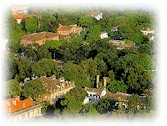| back  photo1 photo1
 photo2 photo2
 photo3 photo3
 photo4 photo4
|
A city of eastern
China east-northeast of Guangzhou. One of the earliest seats of European commerce in
China, it is a major harbor and a manufacturing center. Population, 350,000.
 Xiamen, known in the West as Amoy, has long
been an important trading port both for the Chinese and the Colonialists that were to make
use of it. Xiamen, known in the West as Amoy, has long
been an important trading port both for the Chinese and the Colonialists that were to make
use of it.
Gulangyu
A tiny island covers 1.8 sq km and is located just 500 meters (1,640ft) across the water
from the southwest of Xiamen. It only takes 10 minutes by boat to reach Gulangyu. The
island became a foreign enclave following the Treaty of Nanking in 1842.
The attractive 19th century buildings have been well preserved and the island overflows
with trees, shrubs and flowers. There are no motor vehicles on Gulangyu and it is known in
China as the Garden on the Sea. Gulangyu is also called the Island of Music as local
residents have a great love of music. On an island with a population of 20,000 it is said
that 500 households own pianos.
Jimei School Village
It was built in 1993 with funds provided by a famous philanthropist and educationalist who
was a native of Xiamen. Tan Kah Kee (1874-1961) left Xiamen for Singapore and made his
fortune in industry. As an overseas Chinese who contributed so much to his hometown, Tan
is a revered figure in Xiamen. He also founded Xiamen University. His tomb is close to the
entrance of Jimei School Village in Ao Park.
Occupying an area of 100,000 sq meters, Jimei School Village has universities, colleges,
secondary schools, primary schools and kindergartens with 10,000 students and teachers.
Nan Pu Tuo Temple
The Temple is located in the south of Xiamen at the foot of Five Old Men's Peak. It is
dedicated to the Buddhist Goddess of Mercy, Guanyin and was first built during the Tang
dynasty (618-907AD). It has been extensively restored and covers 30,000 sq meters with
magnificent main halls and side buildings. The temple houses 28 jade statues of Buddha
from Myanmar and a vast amount of Buddhist scriptures in Chinese and other languages. The
vegetarian food served at Nan Pu Tuo Temple has a good reputation.
(back) |